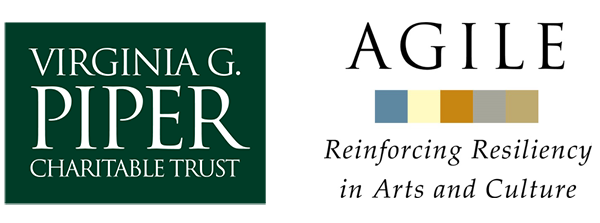
In 2017, Virginia G. Piper Charitable Trust launched AGILE, a two-year project designed to strengthen a selected set of mid-sized to large arts organizations. Piper Trust selects up to four arts and culture organizations with operating budgets of at least $1 million for its AGILE cohorts.
AGILE employs a capacity + capital approach to organizational resilience.
AGILE approaches capacity building using a format similar to Piper Trust’s ATLAS project, which helps build the operating capacity of mission-critical Maricopa County nonprofits. Key capacity building components include:
- assistance from a consultant with expertise in nonprofit lifecycles
- a facilitated Lifecycles Self-Assessment
- a business plan to address the issues identified in the assessment
- a financial investment to support the capacity needs identified
The goals of AGILE’s capacity building are to increase the operational skills of the participants and the overall strengths of each organization and additionally, to examine and improve the habits and practices which inform current decision-making.
Coupled with capacity building, AGILE provides strategic capital investments designed to foster long- and short-term financial health and resilience. The capital provided is based on the business plan and consistent with each grantee organization’s needs. Strategic capital investments may take many forms based on the outcome of the assessment but do not provide general operating support or endowment funds.
An evaluation accompanies the AGILE process.
WHAT WILL AGILE PROVIDE FOR AN ORGANIZATION?
Organizations selected by Piper Trust for AGILE receive the following services and investments:
- A consultant trained by the Nonprofit Lifecycles Institute, founded and led by Dr. Susan Kenny Stevens, for two years to:
- facilitate the Lifecycles Self-Assessment
- assist the organization’s team in developing capacity improvement, capitalization, and business plans
- ensure overall progress and success
- Grant funds for capacity improvements and strategic capitalization support related to issues identified in the self-assessment and business plans. Examples of anticipated strategic capital support may include:
- Capacity improvement funds—for example, funds to strengthen administrative and financial systems related to fundraising, donor databases, accounting, marketing, and box-office software, etc.
- Business plan investments to create or strengthen ongoing financial resilience.
- Flexible reserves to endure short-and long-term cash flow issues or to undertake artistic risk.
- A series of required learning modules and financial conversations for organizations’ Leadership Team participants to accompany the capacity + capitalization support. Six cohort Leadership Team meetings over AGILE’s two-year process will explore:
- the importance of financial health to sustainable artistic programming
- sustaining capacity building and organizational change
- capital development strategies for working capital and reserves
PROJECT DESIGN
Elements of Project Design are:
- complete Lifecycles Assessment and develop capacity building plan and/or business plan with consultant; grant awards will be based on the Lifecycles Assessment and/or plan(s) (year one)
- adoption of reserve policies if awarded funds for reserves (year one and possibly year two)
- participation in six Leadership Team Cohort meetings (over two years)
- consultations with Dr. Susan Kenny Stevens (as needed throughout the project)
PARTICIPANT SELECTION
Piper Trust selects grantees for AGILE based on the following criteria:
- mid-size to large arts organization in Maricopa County with a budget of at least $1 million
- at least three full-time staff
- diminishing pattern of annual deficits over the past three years (if applicable) and/or plans to reduce deficits
- a board treasurer and incoming board chair who commit to serving on the AGILE Leadership Team for the two-year period, along with the managing/executive/general director
- board, artistic, and management commitment to understand and address immediate and longer-term financial well-being in support of sustaining the artistic mission
APPLICATION PROCESS
AGILE is intended to help equip participants to effectively address critical challenges/opportunities and, in some cases, reposition the organization for the long term. The application process informs Piper Trust’s understanding of an organization’s readiness and fit for AGILE.
Organizations being considered for AGILE will be asked by Piper Trust to submit a brief application letter indicating:
- Immediate or ongoing core challenges the organization faces, and how you see the supports provided by AGILE helping to address these challenges. The desire to build on and improve current operational functioning, planning, and financial health are important prerequisites for AGILE. This question should be approached as the “case” for why an organization should participate in AGILE.
- Leadership Team Members Names and Commitment to Participate. Each organization must have the commitment of at least four individuals to serve on a Leadership Team throughout the two-year duration. Leadership Teams are comprised of the current and/or incoming board chair and the board treasurer, the managing director and where possible the artistic director, and one or more key board members or management staff.
- Institutional Capacity and Readiness. Each organization must examine and state its ability to fully participate in all AGILE activities and ensure consistent and substantive involvement by its Leadership Team in both organizationally-specific and cohort activities over the two years.
EVALUATION AND LEARNING APPROACHES
- Among several reporting tools, an Annual Reflection identifies what both the organizations and consultants are learning and tracks operational and financial changes in progress. These reflection reports may be supplemented by interim grant reports with questions tailored to the organization.
- A Formative Evaluation conducted by Piper Trust program and evaluation staff assesses and tracks progress in developing organizational capacities and financial strength; this is done through the organization’s assessment results, grantee business plans and activities, and observation of the six Leadership Team meetings.


